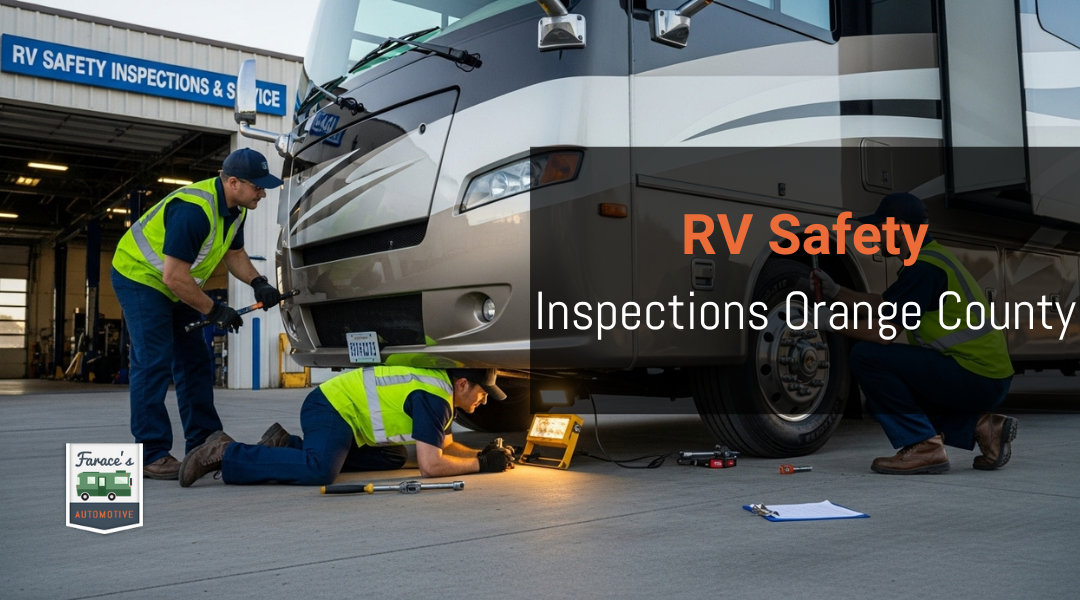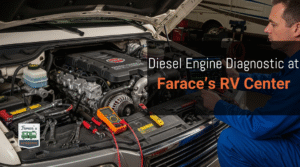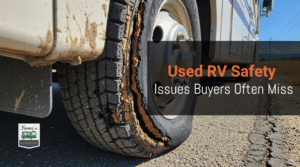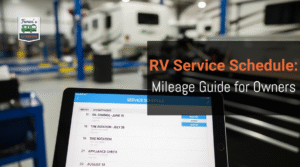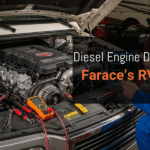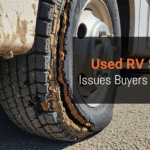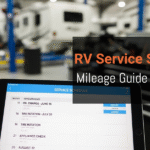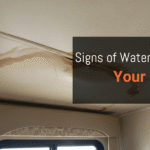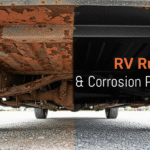Keeping your RV safe and reliable requires more than just routine oil changes and tire checks. Scheduling an annual safety inspection ensures your RV stays roadworthy, prevents costly breakdowns, and protects everyone on board. Just like any vehicle, an RV’s systems wear over time, and catching issues early can save you from major repairs and unexpected downtime.
In Orange County, where RVs see heavy use for coastal trips, desert getaways, and long drives up the I-5, regular inspections are especially important. From brakes and tires to electrical systems and roof seals, every component plays a role in keeping your travels safe and stress-free. Skipping an inspection may seem like a small risk, but it often leads to bigger problems that could have been avoided.
At Farace Automotive & R.V. Center in Huntington Beach, you gain the peace of mind that comes from over 40 years of specialized RV experience. Certified technicians use advanced diagnostic tools and proven repair methods to identify issues before they become emergencies. With a trusted team on your side, you can focus on enjoying the journey instead of worrying about what might go wrong.
The Importance of Annual RV Safety Inspections
Annual inspections help you stay ahead of costly repairs, maintain the value of your RV, and reduce risks on the road. They also ensure that critical systems remain reliable, protecting both your travel plans and the safety of everyone inside and around your vehicle.
Protecting Your Investment and Extending RV Lifespan
Your RV is a significant financial commitment, and routine inspections help you preserve its condition. By checking systems like the engine, transmission, suspension, and electrical components, you can identify wear before it leads to expensive breakdowns.
Preventive maintenance also reduces the chance of sudden failures that could shorten the lifespan of major components. For example, spotting small leaks early prevents water damage that can weaken the structure and lower resale value.
An annual inspection also keeps service records up to date. Documented maintenance not only improves reliability but also increases buyer confidence if you decide to sell. A well-maintained RV typically commands a higher resale price compared to one with limited service history.
Key areas addressed during inspections often include:
- Mechanical systems: engine, brakes, transmission
- Electrical systems: wiring, batteries, charging systems
- Structural integrity: roof, seals, flooring
- Safety equipment: lights, tires, emergency gear
Ensuring Safety for Your Family and Other Drivers
Safety remains one of the most important reasons to schedule yearly inspections. RVs are larger and heavier than most vehicles, which means small problems can quickly turn into serious hazards on the road.
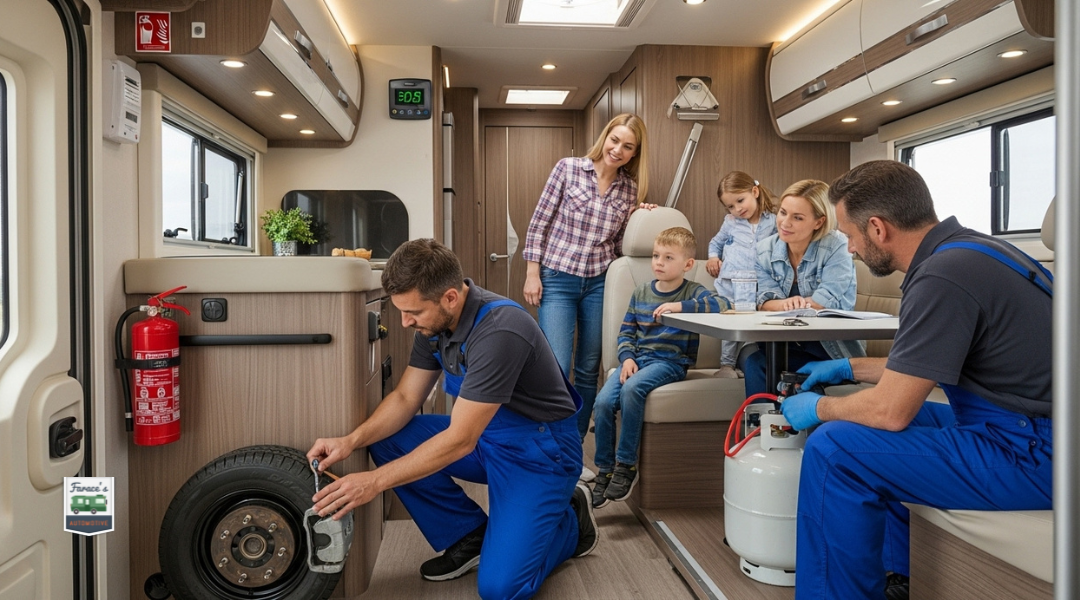
Brakes, tires, and steering systems require close attention because failures in these areas can increase the risk of accidents. Regular inspections confirm these components are working properly and meet safety standards before you travel.
Inspections also check propane systems, fire extinguishers, and detectors for carbon monoxide or smoke. These features protect you while parked or camping, where hidden risks can be just as dangerous as issues on the highway.
By verifying that your RV meets safety requirements, you reduce risks not only for your family but for other drivers sharing the road. This makes annual inspections an essential responsibility for every RV owner.
Common Issues Found During RV Inspections
Many RVs develop recurring problems that affect safety, performance, and comfort. Regular inspections identify these issues early, preventing costly repairs and reducing the risk of breakdowns while traveling.
Brake and Tire Wear
Your RV’s braking system and tires take on heavy loads, making them some of the most critical components to monitor. Worn brake pads, thinning rotors, or leaking brake lines can reduce stopping power, especially on steep grades or in emergency situations.
Tires often show uneven tread wear from misalignment or improper inflation. Cracks in the sidewalls, bulges, or dry rot may also appear when an RV sits unused for long periods.
You should check tire age as well. Even if tread looks fine, rubber compounds harden over time, increasing the chance of a blowout. Inspections confirm whether replacement is needed before long trips.
Key checks include:
- Brake pad thickness
- Rotor condition
- Tire tread depth
- Sidewall cracking or weathering
- Proper inflation pressure
Roof Leaks and Seal Failures
Your RV’s roof is constantly exposed to sun, rain, and debris. Over time, sealants around vents, skylights, and seams can dry out or crack, allowing water intrusion. Even small leaks can cause hidden damage to insulation, wood framing, or electrical systems.
Inspectors often find soft spots in the roof decking or discoloration on the ceiling inside. These are signs that moisture has already entered. Once water damage spreads, repair costs increase significantly.
Routine inspection ensures that seals are intact and protective coatings are still effective. Resealing vulnerable areas is a common preventive step.
Areas most prone to leaks:
- Roof seams
- Vent and skylight edges
- Air conditioning units
- Ladder and rack mounting points
Electrical and Generator Malfunctions
Electrical systems in RVs combine both 12-volt DC and 120-volt AC power, which makes them more complex than standard vehicles. Loose wiring, corroded connections, or faulty breakers can interrupt power to lights, appliances, or safety devices.
Generators also require attention. Lack of maintenance often leads to fuel system clogs, worn spark plugs, or difficulty starting. If a generator runs poorly, it can affect air conditioning, refrigeration, and other essential systems when you are not connected to shore power.
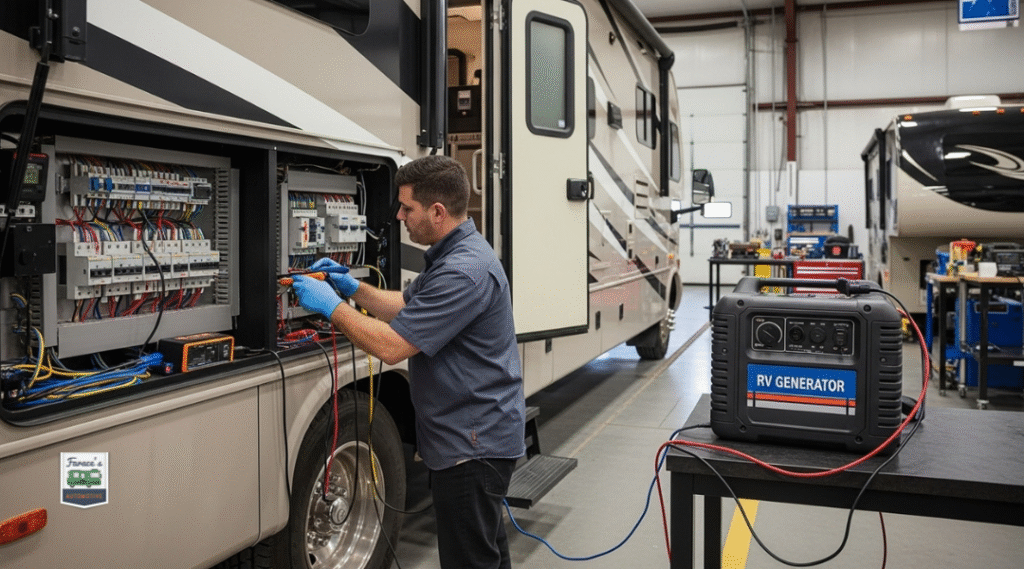
You should also verify that outlets and GFCI breakers function correctly. An inspection ensures that grounding is safe and that no wiring is overheating behind panels.
Common problems found:
- Battery corrosion
- Tripped or weak breakers
- Generator fuel issues
- Damaged extension cords or adapters
Hitch, Suspension, and Towing Concerns
The hitch and suspension system directly affect towing safety. Worn suspension bushings, loose bolts, or sagging springs can lead to poor handling and uneven tire wear. If not corrected, these issues increase the risk of sway or instability on the highway.
Inspectors often find rust or cracks in hitch components. Safety chains, weight distribution bars, and sway controls also need to be checked for proper function.
For motorhomes, suspension inspections may reveal leaking shocks or airbag failures that reduce ride stability. For trailers, improper hitch height or tongue weight can create unsafe towing conditions.
Inspection focus points:
- Hitch coupler and locking mechanism
- Suspension bushings and springs
- Shock absorbers or airbags
- Safety chains and pins
- Alignment of towing setup
Why Annual Inspections Are Especially Critical in Orange County
Living in Orange County exposes your RV to unique environmental conditions that can speed up wear and damage. Coastal air and strong sunlight both contribute to issues that routine maintenance may not fully prevent without a thorough inspection.
Impact of Coastal Salt Air on RV Components
When you park or drive near the coast, salt particles in the air settle on metal, paint, and undercarriage parts. Over time, this leads to corrosion, especially on frame components, electrical connectors, and brake systems.
Moisture in the air accelerates this process. Even stainless steel parts can show signs of pitting if not regularly cleaned and checked. Paint coatings and sealants also degrade faster, which allows water intrusion into seams and roof panels.
During an inspection, technicians can identify early rust formation, weakened fasteners, and deteriorated seals. Preventive measures such as protective coatings, lubrication, and seal replacement help extend the life of your RV. Without these checks, corrosion can spread unnoticed and result in costly structural or safety repairs.
Heat, Sun, and Seasonal Travel Patterns in Southern California
Strong UV rays in Southern California cause roof membranes, tires, and exterior plastics to age faster. Rubber seals around windows and slide-outs become brittle, increasing the risk of leaks. Tires may appear fine but can develop sidewall cracks from constant sun exposure.
Heat also affects your RV’s cooling systems. Air conditioning units and ventilation fans work harder, which increases wear on belts, motors, and refrigerant lines. Inspections ensure these systems remain reliable before peak summer travel.
Seasonal travel habits add another layer of stress. Many owners store their RVs for months, then take long trips during vacation periods. Inspections confirm that brakes, batteries, and fuel systems are ready for extended use after sitting idle. This reduces the risk of breakdowns during busy travel seasons.
Key Components Checked in a Professional RV Safety Inspection
A thorough RV safety inspection focuses on critical systems that affect reliability, comfort, and safety. Attention is given to mechanical performance, structural integrity, utility systems, and emergency equipment to ensure your RV remains roadworthy and safe for travel.
Engine and Drivetrain Systems
Your RV’s engine and drivetrain determine how reliably you can travel long distances. A professional inspection checks for oil leaks, worn belts, and fluid levels in the engine, transmission, and differential. Mechanics also verify that filters are clean and that coolant and transmission fluids are at proper levels.
The drivetrain inspection includes examining drive shafts, axles, and universal joints for wear or damage. Proper lubrication is confirmed, and any abnormal vibrations or noises are investigated.
Braking systems are also evaluated, including brake pads, rotors, and hydraulic lines, since heavy RVs place extra stress on these components. Tire condition and alignment are reviewed to reduce uneven wear and improve handling.
By addressing these areas, you reduce the risk of breakdowns and improve fuel efficiency while ensuring your RV can safely handle highway speeds and steep grades.
Roof, Windows, and Weather Seals
Your RV’s roof and seals protect against water damage, which is one of the most common and costly problems owners face. Inspections include checking for cracks, soft spots, and worn sealant on the roof surface.
Technicians look for gaps around vents, skylights, and antennas, since these are frequent points of water intrusion. Windows and entry doors are also examined to confirm that seals remain flexible and intact.
If seals are brittle or peeling, resealing is recommended to prevent leaks. Even small cracks can allow moisture to enter, leading to mold, rot, or electrical damage inside the RV.
Regular checks of these areas help extend the life of your RV’s structure and prevent expensive repairs caused by unnoticed leaks.
Appliances, Plumbing, and Electrical Systems
An RV inspection covers the systems that make living inside comfortable and functional. Appliances such as refrigerators, stoves, and furnaces are tested for safe operation. Gas lines are checked for leaks, and propane regulators are evaluated for proper pressure.
Plumbing systems are inspected for leaks, water pump performance, and tank condition. Both fresh water and waste systems are reviewed to confirm valves and hoses are working correctly.
The electrical system is tested at both 12-volt DC and 120-volt AC levels. Inspectors verify that outlets, circuit breakers, and batteries are functioning safely. Shore power connections and inverters are also checked for proper wiring and grounding.
These inspections ensure that your RV’s utilities remain safe to use and capable of supporting extended trips without unexpected failures.
Safety Equipment: Alarms, Extinguishers, and Lighting
Safety devices are critical in preventing accidents and protecting lives. Inspectors confirm that smoke detectors, carbon monoxide alarms, and propane leak detectors are installed and working. Batteries are tested or replaced as needed to ensure reliability.
Fire extinguishers are checked for expiration dates, proper pressure, and mounting security. A non-functional extinguisher provides no protection in an emergency, so replacements are made if necessary.
Exterior and interior lighting is evaluated for brightness, wiring condition, and lens clarity. Functional brake lights, turn signals, and headlights are essential for road safety, while interior lighting ensures safe movement inside the RV.
By verifying that all safety equipment is operational, you reduce risks and ensure compliance with essential safety standards.
Benefits of Scheduling Your Inspection at Farace Automotive & RV Center
You gain the advantage of long-standing experience, locally trusted ownership, and the convenience of comprehensive repair solutions in one place. Each of these factors helps ensure that your RV receives reliable care without unnecessary delays or uncertainty.
Over 40 Years Serving Orange County RV Owners
When you schedule your inspection at Farace Automotive & RV Center, you benefit from more than four decades of consistent service in Huntington Beach. This history reflects stability and a proven track record of working with RVs of all makes and models.
Over the years, the shop has built familiarity with common wear issues specific to the Southern California climate. Salt air, sun exposure, and seasonal travel patterns can all affect the condition of your RV differently than in other regions.
By choosing a shop that understands these local conditions, you reduce the chance of overlooked problems. Long-term experience also means technicians have seen a wide range of issues and know how to address them efficiently.
Veteran-Family-Owned with Trusted Local Expertise
Farace Automotive & RV Center is veteran-family-owned, which means you’re working with a business rooted in discipline, accountability, and community values. This ownership structure often leads to closer customer relationships and a focus on long-term trust rather than quick transactions.
You can expect straightforward communication about what your RV needs and why. The team’s local expertise also comes from serving families and travelers in the area for years, giving them insight into the specific challenges Orange County RV owners face.
This combination of military background and family operation provides a balance of professionalism and personal service. You know the shop is invested not only in your RV but also in maintaining its reputation in the community.
Full-Service Repairs if Issues Are Found During Inspection
If your inspection reveals problems, you don’t need to take your RV elsewhere. Farace Automotive & RV Center provides full-service repair capabilities that cover both automotive and RV-specific systems.
Services include:
- Brake and suspension work
- Electrical and lighting repairs
- Roof and seal maintenance
- Engine and transmission service
This means you can move directly from inspection to repair without scheduling with multiple providers. Having everything handled in one location saves you time and reduces the risk of miscommunication between different shops.
With both inspections and repairs under one roof, you can keep your RV road-ready with fewer interruptions to your travel plans.

